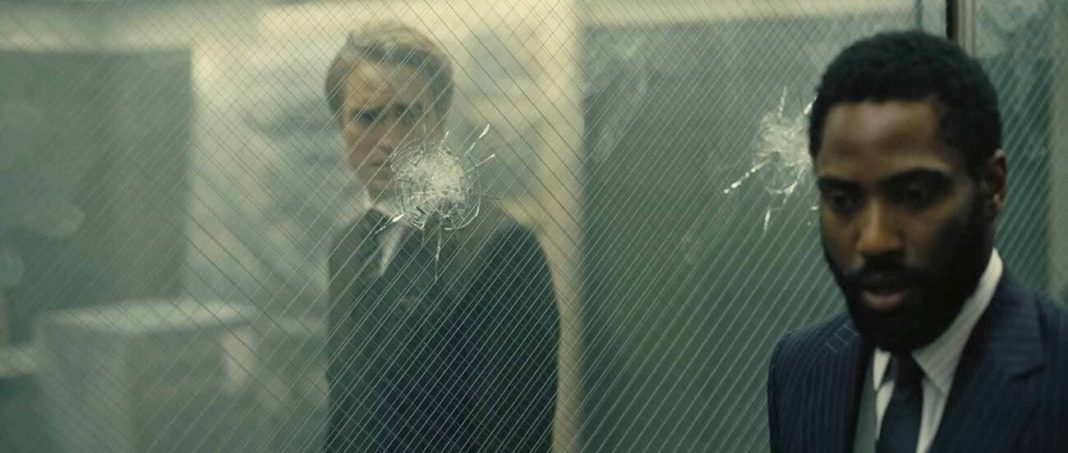West Palm Beach, FL. One of the most anticipated film releases of 2020 so far has been Tenet, Christopher Nolan’s newest work. Like many of Nolan’s movies, Tenet combines action sequences with a complicated and cerebral plot, features a mind-bending approach to time, and includes characters in overwhelming circumstances trying to save the world. In 2020’s summer of shifting expectations and realities, anticipation for the film rose because Nolan and the studio insisted on holding out for a theater release. In some ways it was the best year for the film, because many people in America are experiencing time in unusual ways and we, too, sometimes seem to be in the middle of a fast-paced and confusing plot. Tenet not only offers us entertainment, it may also offer us a helpful perspective on how to live well in our own turbulent season.
(Warning, a few spoilers below, but not many.)
As Tenet begins, the “Protagonist” is charged with saving the world from a threat he is not fully briefed on and will have to discover along with its solution. We know almost nothing about him, not even his name, only that he is a dedicated and skilled CIA agent. We don’t know why he was chosen other than his loyalty, but we know that everyone’s fate is in his hands.
In this way, Tenet begins in a somewhat typical fashion. It is not unusual for the main character in a movie to be tasked with saving the world, especially if it is an action movie or part of a superhero franchise. The main character will have to triumph over his circumstances and weaknesses, put aside his own interests, and self-actualize to a remarkable world-saving degree. Many of us relate because we often feel ourselves to have undeveloped potential and be in circumstances that we must triumph over.
We may not live in the challenging times of Tenet, but we do live in challenging times. And our rhetorical surroundings encourage us to see ourselves in an apocalyptic environment. If we watch the news, there is a new crisis every minute. Messaging from all over suggests that we need to save all kinds of things… we must save the planet, save democracy, save the liberal arts, save football, save the economy, save the children, and put money into savings. Like the characters in most of Nolan’s films, we are always running out of time. How can we behave ethically, even heroically, in these circumstances?
Many of our cultural narratives imply that we must be difficult and/or detached to achieve greatness. This is the thread that unites Sherlock Holmes and Steve Jobs. But what if we are attached and sometimes tender? In Tenet, our Protagonist forms a relationship with a woman, Kat. It’s not a James Bond-type relationship, but one grounded in recognition of her value as a human being and as a mother. For the rest of the film, the Protagonist is committed to saving Kat even when it seems to endanger his mission. What might happen if we prioritize a woman and a child when the world is at stake?
Quite often our culture encourages us to make our significant decisions in a somewhat detached way. Some suggest we should vote based solely on policy, or that we can best understand ethics exclusively through principles, without much consideration of real-life people and relationships. In television and movies, heroes often push away the ones they love, because relationships can be obstacles or endangering for one or both parties. But what if love is not a liability, but a force greater than gravity?
In Christopher Nolan’s Interstellar, Cooper is raising his kids on a dying planet when he learns that he must go into space to discover a habitable world to keep humanity alive. The leader of the project, Professor Brand, and his colleagues urge Cooper to think of his mission in terms of humanity and to act on its behalf. But Cooper is consistently driven to act on behalf of his own children and directs his life according to his love for them. In Interstellar, heroes don’t just operate on behalf of ideals but on behalf of real individuals. And Professor Brand, who claims to want to save humanity, has deceived and betrayed all who are closest to him.
In all three of Christopher Nolan’s most recent films, there is an unusual emphasis on proximity and the importance of the people around us. From Cooper in Interstellar, to the civilian sailors in Dunkirk, to the Protagonist in Tenet, the ones who save the world are the ones who save the people around them, the particular people whom they love. It is reminiscent of the saying from the Talmud, “whoever saves one life saves the world entire.”
The heroes in Nolan’s films still have principles and still want to save the world. Those who only care about themselves are still the villains. Heroism still requires self-sacrifice and a certain set of skills. But heroes are not the products of individual greatness fueled solely by conviction or superhuman ability and put into the right circumstance, even if they are individually great. Instead their greatness is achieved and fueled by their embrace of relational bonds and community. This is more than thinking globally and acting locally.
If we look to our own circumstance, these films argue that we can do what is within reach. In Dunkirk, Nolan told many stories, including that of civilian sailors, who set out in small boats to save the British military and keep the fight against the fascists alive. It was an overwhelming task, but one achieved through heroic actions undertaken in the orbit available. No one person saved the British war effort, but men like Mr. Dawson plucked individuals from the water and saved small groups of soldiers and, in so doing, helped prevent Allied defeat.
We know from all kinds of cultural messaging that the life you save is not your own. But neither is the world you save—it is one which belongs to real people who exist and have meaning in connection with one another. In biblical terms, John writes that “anyone who does not love his brother, whom he has seen, cannot love God, whom he has not seen.” Neither can we love and serve humanity without loving and serving the humans around us. The “best thing” for our national community is likely not what will be the worst thing for your annoying neighbor.
Christopher Nolan’s recent films put an emphasis on proximity and the power of personal relationships. Our best efforts do not come from detached and isolated lives and actions. Heroes retain the ability to relate and are motivated by care for others around them—even those they do not know well. This is more than a myopic response to overwhelming circumstances and an excess of information. It is reminiscent of the posture William Blake encouraged us to take in “Auguries of Innocence.”
To see a world in a grain of sand
And a heaven in a wild flower
Hold infinity in the palm of your hand
And eternity in an hour
If we were to achieve this perspective, it would be a basis for profound action in our often overwhelming times.













Another thought-provoking essay, Elizabeth. Thanks.
The quote from John strikes me as closer to the notion of transcendence than proximity. Or perhaps we could compromise and call it connectedness?
If you cannot recognize the Other, then how in your mortal and finite state can you recognize God? The emphasis here seems to be on a connection or unity with those who are unseen and, by implication, unlike ourselves but with something in common.
Ironically, Interstellar develops this notion further when we learn at the end that the “ghost” communicating with Cooper’s daughter was actually his future self. That’s another type of connectedness explored by Nolan.
Comments are closed.